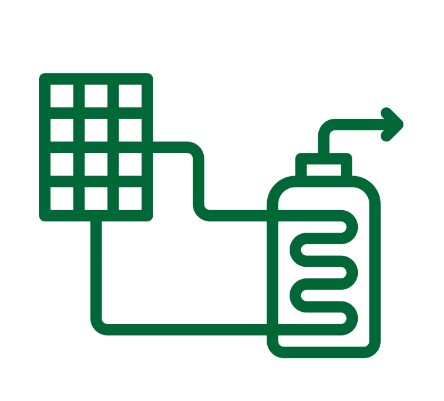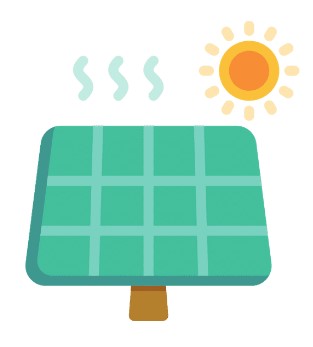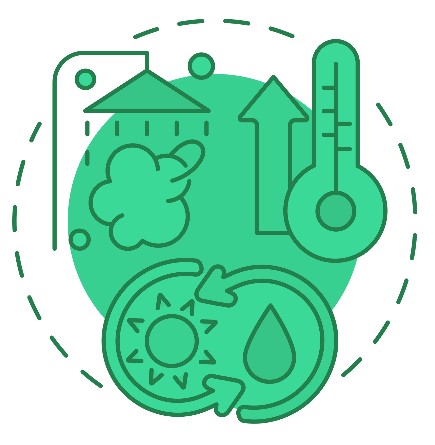Your basket is currently empty!
Written by
Solar Thermal & Hot Water Heating Solutions

Curious about heating water with solar panels for your home’s hot water? Solar thermal systems are an eco-friendly and cost-effective way to harness the sun’s energy.
This article dives into how these systems work, their benefits, types, costs, and installation details to help you decide if they are right for your home.
Start Your Solar PANEL Project Today
Buy 1 get 1 FREE Solar Panels With Installation!
Solar Finance Options & Price Match Too!
Key Takeaways
- Solar water heating systems utilise solar collectors to efficiently heat water, offering significant cost savings and environmental benefits compared to traditional heating methods.
- The two main types of solar thermal collectors, flat plate and evacuated tube, differ in installation costs and efficiency, with the latter being more suitable for colder environments.
- Factors such as roof orientation, structural integrity, and compatibility with existing systems are crucial in evaluating a home’s suitability for solar hot water installation.
Understanding Solar Panels for Hot Water

Solar water heating systems are an innovative solution that uses solar panels and solar water heating panels to absorb sunlight and transfer heat to water, stored in a dedicated hot water cylinder.
These systems primarily heat water for bathing, showering, and other domestic uses, providing an eco-friendly and cost-effective alternative to even the most energy efficient combi boilers and traditional heating methods.
The efficiency of solar water heating work is evident in their ability to reduce energy costs.
To understand the benefits and practicalities, it’s important to know how solar thermal technology works and the types of solar thermal collectors.
How Solar Thermal Technology Works
At the heart of any solar water heating system are solar collectors, commonly mounted on rooftops to capture the sun’s energy.
These collectors convert infrared waves into heat energy, which is then transferred to a fluid mixture, usually water and glycol, circulating through the system.
This heated fluid flows through a heat exchanger, warming the water stored in your hot water cylinder.
Remarkably, solar thermal systems can still generate hot water even on cloudy days, ensuring a consistent supply of heated water throughout the year.
Types of Solar Thermal Collectors

There are two main types of solar thermal collectors: flat plate collectors and evacuated tube collectors. Flat plate collectors have a box-like design and are typically heavier and more rigid.
They can be installed either on the roof or integrated into the roof itself.
These collectors are generally more affordable to install, making them a cost-effective choice for many homeowners. However, they may be less efficient in low-radiation environments compared to their counterparts.
Evacuated tube collectors, on the other hand, are designed to be highly efficient, particularly in colder conditions.
These systems consist of multiple glass tubes, each containing a vacuum that minimises heat loss.
While evacuated tube collectors are typically more expensive, their superior performance in challenging conditions can make them a worthwhile investment.
Knowing these differences helps in choosing the right type of solar thermal collector for your needs.
Comparing Solar Thermal and Solar PV Panels
While both solar thermal and solar PV panels harness energy from the sun, their purposes and functionalities differ significantly.
Solar thermal panels are specifically designed to heat water using solar collectors that convert infrared light into heat energy. This heat is then transferred to your water system, providing a sustainable hot water supply.
In contrast, solar PV panels generate electricity by converting sunlight directly into electrical energy. These panels are ideal for powering household appliances and reducing electricity bills.
When deciding between the two, consider your primary energy needs—whether you’re looking to cut down on electricity costs or focus on heating water efficiently.
Both systems offer substantial benefits, but their applications and outcomes are distinct.
Start Your Solar PANEL Project Today
Buy 1 get 1 FREE Solar Panels With Installation!
Solar Finance Options & Price Match Too!
Benefits of Using Solar Hot Water Systems

Solar hot water systems offer a myriad of benefits, making them an attractive option for eco-conscious homeowners.
From significant cost savings on energy bills to reducing carbon emissions and requiring minimal maintenance, these systems provide a sustainable and efficient solution for heating water.
Exploring these advantages reveals why investing in a solar water heating system is a smart choice.
Cost Savings on Energy Bills
One of the most compelling reasons to install a solar water heating system is the potential for substantial cost savings on energy bills.
By harnessing free energy from the sun, these systems can reduce hot water bills by up to 50%. For a typical household, this means significant long-term savings, as solar thermal systems can meet around half of your hot water needs.
Additionally, government incentives and tax credits can further offset the initial investment, making solar water heating an economically viable option.
Environmental Impact
The environmental benefits of solar hot water systems are equally impressive. By utilising renewable energy from the sun, these systems considerably reduce carbon emissions, contributing to a greener, more sustainable future.
Unlike traditional heating methods, solar thermal technology does not release harmful pollutants into the atmosphere, making it an eco-friendly choice.
By lowering your household’s carbon footprint, you can play a part in combating climate change and promoting environmental stewardship.
Low Maintenance Requirements
Another advantage of solar hot water systems is their low maintenance requirements. Unlike conventional heating systems, which may require frequent servicing, solar water heating systems typically need minimal upkeep.
Homeowners can perform simple annual checks, such as inspecting the pressure gauge and monitoring the control panel for warnings.
Professional servicing is recommended every few years, but overall, the maintenance costs remain low, adding to the system’s appeal.
Evaluating Your Home’s Suitability for Solar Hot Water
Before investing in a solar water heating system, it’s essential to evaluate your home’s suitability. Factors such as roof orientation and space, structural integrity, and compatibility with existing heating systems play a crucial role in determining the effectiveness of solar thermal panels.
Let’s explore these considerations in detail to ensure your home is a good fit for solar water heating.
Roof Orientation and Space
Solar panels perform best when positioned on a south-facing roof at an angle between 30 to 65 degrees, maximising sunlight exposure and ensuring efficient operation year-round.
Additionally, you will need around two to five square meters of free space on your roof to accommodate the panels. Homes with flat roofs can also benefit, as solar collectors can be mounted on frames to achieve the desired angle.
Structural Integrity
The structural integrity of your roof is another critical factor to consider. Solar panels add weight to your roof, so it’s important to ensure that your roof structure is strong enough to support the installation.
A structural engineer or qualified installer can assess whether any reinforcements are needed to ensure safety and stability.
Compatibility with Existing Heating Systems
Assessing the compatibility of your existing heating system with a solar hot water system is essential for efficient operation.
Solar thermal systems can work effectively with most conventional boilers and immersion heater, provided they can accept pre-heated water.
If you have a combi boiler, additional adaptations may be required to ensure seamless integration. A professional installer can help determine the best setup for your home.
Solar panels and heat pumps
In the UK, solar panels can power heat pumps for hot water by generating electricity from sunlight, which is then used to run an air-source or ground-source heat pump. Solar photovoltaic (PV) panels convert solar energy into electricity, which powers the heat pump’s compressor.
The heat pump extracts heat from the air or ground, amplifies it, and transfers it to a hot water storage tank.
This setup works efficiently even in the UK’s variable climate, as heat pumps can operate with low outdoor temperatures, and solar PV can produce energy on cloudy days. Excess electricity can be stored in batteries or diverted to the grid, making it a sustainable and cost-effective solution for home hot water.
Costs and Financial Incentives
Understanding the costs and financial incentives associated with solar water heating systems is crucial for making an informed decision.
While the initial installation costs can be significant, the long-term savings and available government incentives can make this investment worthwhile.
Breaking down the installation costs, potential savings, and government grants can support your transition to solar hot water.
Start Your Solar PANEL Project Today
Buy 1 get 1 FREE Solar Panels With Installation!
Solar Finance Options & Price Match Too!
Installation Costs
The installation cost of a solar water heating system typically ranges between £3,000 and £5,000, depending on the size of your property and the capacity of the system.
Factors such as the type of roof, system size, and regional labor rates can influence the final price.
While the upfront costs may seem high, it’s important to consider the long-term savings and the system’s lifespan, which often includes warranties ranging from 5 to over 10 years.
Potential Savings
Switching to a solar water heating system can lead to substantial savings on your energy bills. For instance, households using gas for water heating can save approximately £105 per year, while those using electricity can save up to £200 annually.
During summer months, solar water heaters can meet up to 90% of your hot water needs, significantly reducing your reliance on conventional heating methods.
Government Grants and Incentives
Government grants and incentives, such as the Renewable Heat Incentive, can provide financial support for installing solar water heating systems.
Homeowners can earn up to £310 annually through this program, helping to offset the initial investment.
Although the program is no longer open to new applicants, other grants and incentives may be available, so it’s worth exploring your options.
Maximising Efficiency of Solar Hot Water Systems
Maximising efficiency in your solar hot water system involves regular maintenance, optimising usage, and making seasonal adjustments.
Let’s explore these strategies to help you achieve the best results from your solar water heating system.
Regular Maintenance Checks
Regular maintenance keeps your solar hot water system in top condition. Inspect the pressure gauge for leaks, monitor the control panel for warnings, and check for antifreeze leaks.
If the solar pipework feels cold on a warm, sunny day, contact your installer for further inspection.
Optimising Usage
Installing a water softener can prevent mineral buildup in the pipes, improving efficiency. Adjusting your hot water usage according to the seasons can also maximise savings, as you could also end up with no hot water if this is your only heating source.
During summer months, when solar energy is more abundant, you can rely almost entirely on your solar heating system, while in winter, you may need to supplement with conventional heating.
Seasonal Adjustments
Seasonal adjustments to your solar hot water system ensure a consistent supply of hot water year-round. Tweaking system settings based on seasonal changes can optimize performance and energy savings.
This approach allows you to make the most of your solar water heating system, regardless of the time of year.
Choosing the Right Solar Hot Water System
Selecting the right solar hot water system involves assessing your household’s hot water consumption, local climate conditions, and available space. Insulating your storage cylinder and pipes can also enhance efficiency.
Evaluating different systems, consulting professionals, and considering planning permissions can help you choose the best system for your needs.
Start Your Solar PANEL Project Today
Buy 1 get 1 FREE Solar Panels With Installation!
Solar Finance Options & Price Match Too!
Assessing Different Systems
When choosing a solar water heating system, consider the two main types: passive systems such as thermosyphon and integral collector-storage systems, and active systems that use pumps.
The required panel area per person is typically between 1 to 2 square meters, with a water tank volume of 30 to 60 liters per square meter of panel area.
Less efficient panels may require more space, so it’s important to select a system that matches your household’s needs and available space.
Consulting Professionals
Qualified installers can help you make informed decisions about your solar hot water system, providing tailored advice based on specific site conditions to ensure optimal performance.
It’s advisable to conduct your own research before inviting a solar panel company to your home and collect multiple quotes to compare options.
This approach helps you find the best deal and ensures the installation is done correctly and efficiently.
Planning Permission Considerations
In most cases, planning permission is not required to install solar thermal panels, making the process relatively straightforward for homeowners.
However, there are exceptions, such as installations on listed buildings, in conservation areas, or on World Heritage Sites, where specific restrictions apply.
It’s essential to check local regulations and obtain any necessary permits to avoid legal complications.
Summary
Solar water heating systems offer a sustainable and cost-effective solution for meeting your hot water needs.
By understanding the technology, evaluating your home’s suitability, and maximising efficiency through regular maintenance and usage optimisation, you can significantly reduce your energy bills and carbon footprint.
The initial investment is substantial, but with potential savings and government incentives, the long-term benefits far outweigh the costs.
As we strive towards a greener future, adopting solar water heating systems is a step in the right direction.
Whether you’re motivated by financial savings, environmental impact, or both, solar hot water systems provide a reliable and efficient means of harnessing renewable energy.
Embrace the power of the sun and transform your home into an energy-efficient haven.
Frequently Asked Questions
What is the cost range of solar water heaters?
Solar water heaters typically range in cost from £3,000 to £5,000, depending on the system and installation. It’s essential to consider your specific needs and budget when choosing a solar water heating solution.
How much can solar water heaters reduce hot water heating costs?
Solar water heaters can reduce hot water heating costs by up to 60%. This substantial savings can significantly lower your energy bills.
What are the two main types of solar water heater collectors?
The two main types of solar water heater collectors are flat plate panels and evacuated tube collectors. Each has its own advantages, catering to different heating needs.
How much hot water can a solar water heater provide in winter?
A solar water heater can typically meet about 25% of your home’s hot water needs during winter. This means it’s a valuable addition to your energy resources, even in colder months.
How many homes in the UK have solar water heaters installed?
Approximately 43,667 homes in the UK have solar water heaters installed. This number reflects the growing interest in renewable energy solutions among
Start Your Solar PANEL Project Today
Buy 1 get 1 FREE Solar Panels With Installation!
Solar Finance Options & Price Match Too!
Written by
Start Your Solar PANEL Project Today
Buy 1 get 1 FREE Solar Panels With Installation!
Solar Finance Options & Price Match Too!
What is in this article?
- Key Takeaways
- Understanding Solar Panels for Hot Water
- Benefits of Using Solar Hot Water Systems
- Evaluating Your Home’s Suitability for Solar Hot Water
- Costs and Financial Incentives
- Maximising Efficiency of Solar Hot Water Systems
- Choosing the Right Solar Hot Water System
- Summary
- Frequently Asked Questions





